Legislation, Ethics, and Regulations in the Travel and Tourism Sector
VerifiedAdded on 2020/10/22
|13
|3901
|250
Report
AI Summary
This report provides a comprehensive overview of the legislation and ethics within the travel and tourism sector. It begins by outlining the legal and regulatory frameworks, including the Development of Tourism Act, transport acts, and regulations related to health and safety, as well as international air and sea transport laws. The report then delves into the impact of health, safety, and security legislation on the industry, emphasizing the importance of creating a safe working environment, protecting consumer data, and adhering to the Occupiers Liability Act. Furthermore, it examines legislation related to equality, including the Sex Discrimination Act, Race Discrimination Act, and Equality Act 2010, highlighting the significance of treating all employees and customers fairly. The report also addresses contract and consumer protection legislation, detailing the legal aspects of holiday packages and the responsibilities of tour operators. Finally, it explores ethical dilemmas faced by the tourism sector and examines the Corporate Social Responsibility (CSR) policy of TUI, concluding with a discussion on the importance of ethical practices and compliance with legal frameworks to ensure the smooth functioning and sustainability of the travel and tourism industry.
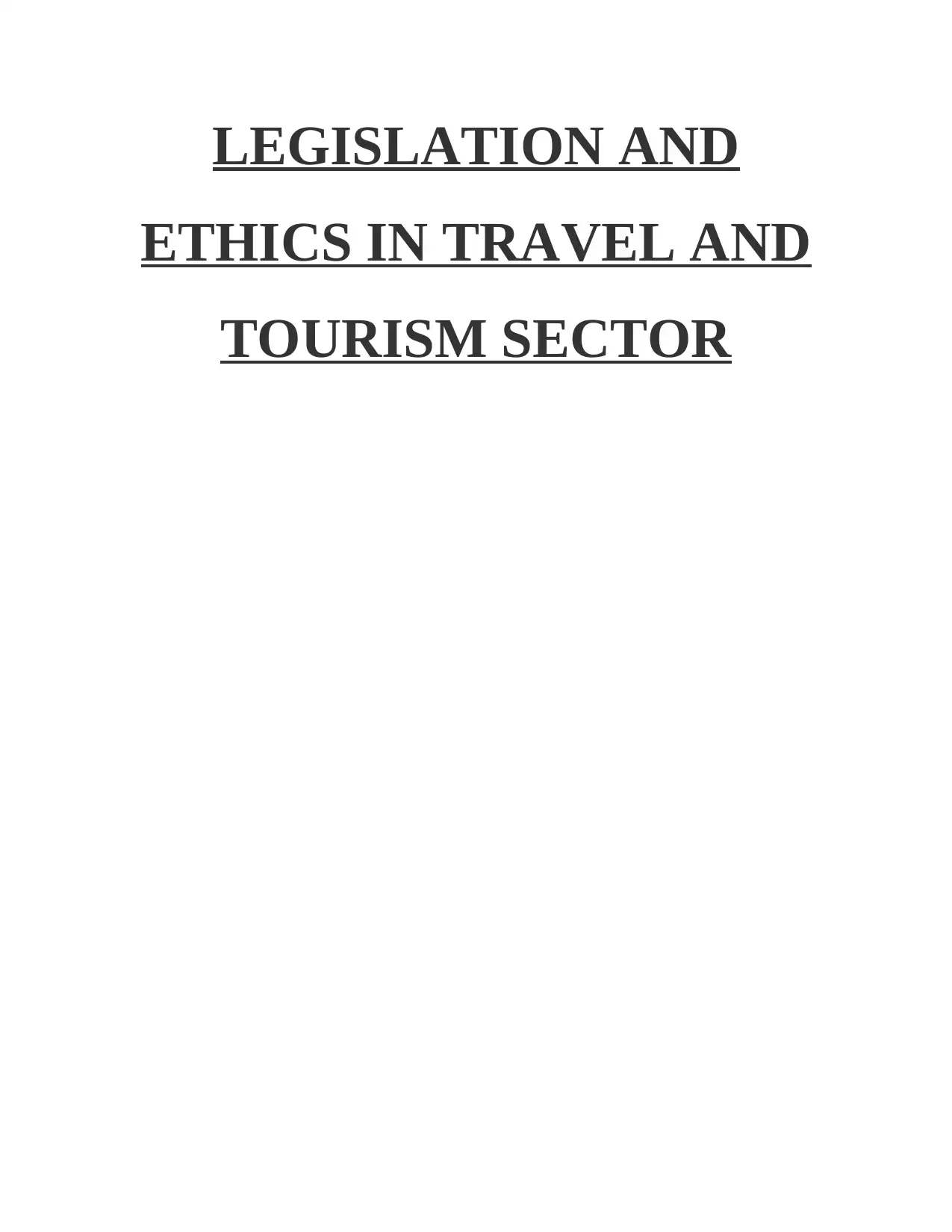
LEGISLATION AND
ETHICS IN TRAVEL AND
TOURISM SECTOR
ETHICS IN TRAVEL AND
TOURISM SECTOR
Paraphrase This Document
Need a fresh take? Get an instant paraphrase of this document with our AI Paraphraser
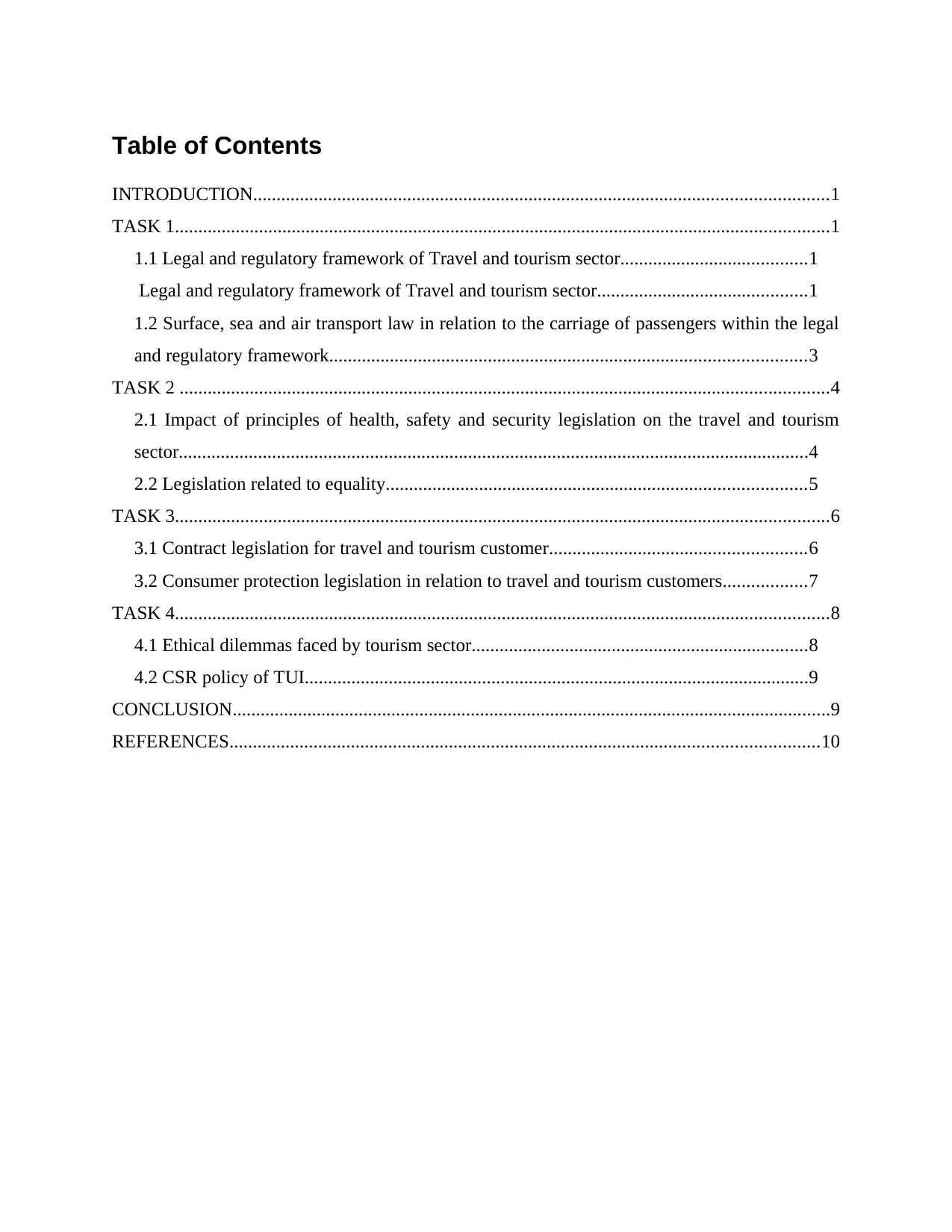
Table of Contents
INTRODUCTION...........................................................................................................................1
TASK 1............................................................................................................................................1
1.1 Legal and regulatory framework of Travel and tourism sector........................................1
Legal and regulatory framework of Travel and tourism sector.............................................1
1.2 Surface, sea and air transport law in relation to the carriage of passengers within the legal
and regulatory framework......................................................................................................3
TASK 2 ...........................................................................................................................................4
2.1 Impact of principles of health, safety and security legislation on the travel and tourism
sector.......................................................................................................................................4
2.2 Legislation related to equality..........................................................................................5
TASK 3............................................................................................................................................6
3.1 Contract legislation for travel and tourism customer.......................................................6
3.2 Consumer protection legislation in relation to travel and tourism customers..................7
TASK 4............................................................................................................................................8
4.1 Ethical dilemmas faced by tourism sector........................................................................8
4.2 CSR policy of TUI............................................................................................................9
CONCLUSION................................................................................................................................9
REFERENCES..............................................................................................................................10
INTRODUCTION...........................................................................................................................1
TASK 1............................................................................................................................................1
1.1 Legal and regulatory framework of Travel and tourism sector........................................1
Legal and regulatory framework of Travel and tourism sector.............................................1
1.2 Surface, sea and air transport law in relation to the carriage of passengers within the legal
and regulatory framework......................................................................................................3
TASK 2 ...........................................................................................................................................4
2.1 Impact of principles of health, safety and security legislation on the travel and tourism
sector.......................................................................................................................................4
2.2 Legislation related to equality..........................................................................................5
TASK 3............................................................................................................................................6
3.1 Contract legislation for travel and tourism customer.......................................................6
3.2 Consumer protection legislation in relation to travel and tourism customers..................7
TASK 4............................................................................................................................................8
4.1 Ethical dilemmas faced by tourism sector........................................................................8
4.2 CSR policy of TUI............................................................................................................9
CONCLUSION................................................................................................................................9
REFERENCES..............................................................................................................................10
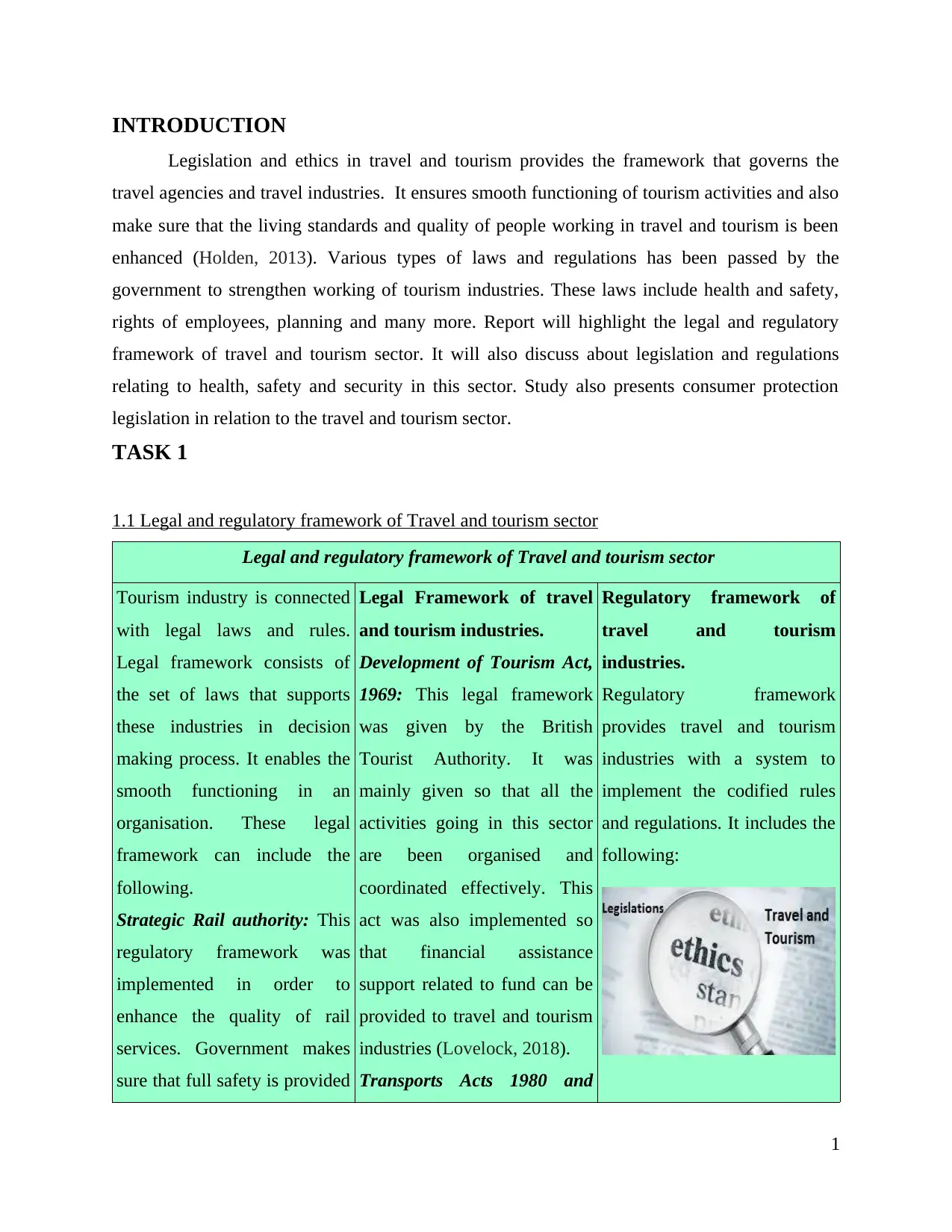
INTRODUCTION
Legislation and ethics in travel and tourism provides the framework that governs the
travel agencies and travel industries. It ensures smooth functioning of tourism activities and also
make sure that the living standards and quality of people working in travel and tourism is been
enhanced (Holden, 2013). Various types of laws and regulations has been passed by the
government to strengthen working of tourism industries. These laws include health and safety,
rights of employees, planning and many more. Report will highlight the legal and regulatory
framework of travel and tourism sector. It will also discuss about legislation and regulations
relating to health, safety and security in this sector. Study also presents consumer protection
legislation in relation to the travel and tourism sector.
TASK 1
1.1 Legal and regulatory framework of Travel and tourism sector
Legal and regulatory framework of Travel and tourism sector
Tourism industry is connected
with legal laws and rules.
Legal framework consists of
the set of laws that supports
these industries in decision
making process. It enables the
smooth functioning in an
organisation. These legal
framework can include the
following.
Strategic Rail authority: This
regulatory framework was
implemented in order to
enhance the quality of rail
services. Government makes
sure that full safety is provided
Legal Framework of travel
and tourism industries.
Development of Tourism Act,
1969: This legal framework
was given by the British
Tourist Authority. It was
mainly given so that all the
activities going in this sector
are been organised and
coordinated effectively. This
act was also implemented so
that financial assistance
support related to fund can be
provided to travel and tourism
industries (Lovelock, 2018).
Transports Acts 1980 and
Regulatory framework of
travel and tourism
industries.
Regulatory framework
provides travel and tourism
industries with a system to
implement the codified rules
and regulations. It includes the
following:
1
Legislation and ethics in travel and tourism provides the framework that governs the
travel agencies and travel industries. It ensures smooth functioning of tourism activities and also
make sure that the living standards and quality of people working in travel and tourism is been
enhanced (Holden, 2013). Various types of laws and regulations has been passed by the
government to strengthen working of tourism industries. These laws include health and safety,
rights of employees, planning and many more. Report will highlight the legal and regulatory
framework of travel and tourism sector. It will also discuss about legislation and regulations
relating to health, safety and security in this sector. Study also presents consumer protection
legislation in relation to the travel and tourism sector.
TASK 1
1.1 Legal and regulatory framework of Travel and tourism sector
Legal and regulatory framework of Travel and tourism sector
Tourism industry is connected
with legal laws and rules.
Legal framework consists of
the set of laws that supports
these industries in decision
making process. It enables the
smooth functioning in an
organisation. These legal
framework can include the
following.
Strategic Rail authority: This
regulatory framework was
implemented in order to
enhance the quality of rail
services. Government makes
sure that full safety is provided
Legal Framework of travel
and tourism industries.
Development of Tourism Act,
1969: This legal framework
was given by the British
Tourist Authority. It was
mainly given so that all the
activities going in this sector
are been organised and
coordinated effectively. This
act was also implemented so
that financial assistance
support related to fund can be
provided to travel and tourism
industries (Lovelock, 2018).
Transports Acts 1980 and
Regulatory framework of
travel and tourism
industries.
Regulatory framework
provides travel and tourism
industries with a system to
implement the codified rules
and regulations. It includes the
following:
1
⊘ This is a preview!⊘
Do you want full access?
Subscribe today to unlock all pages.

Trusted by 1+ million students worldwide
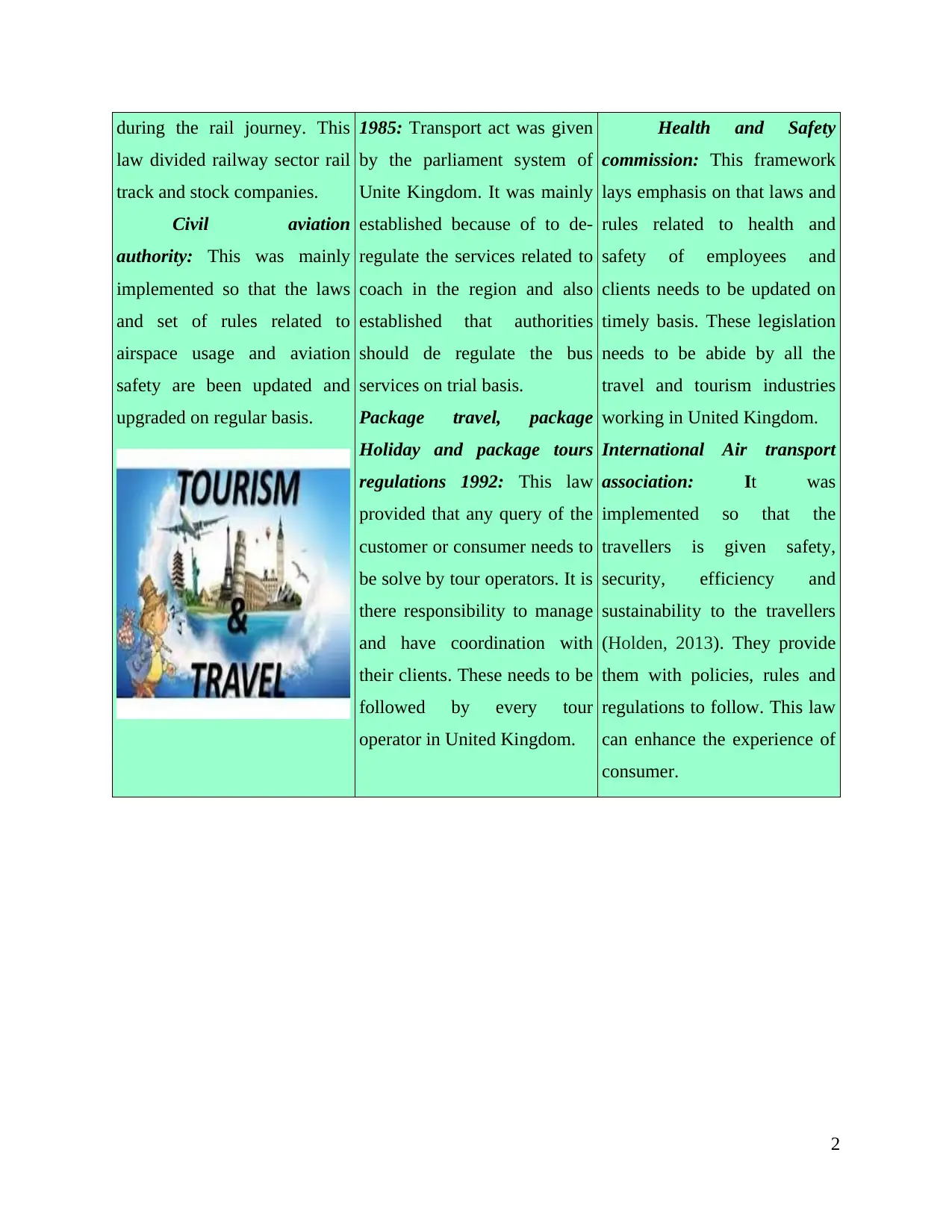
during the rail journey. This
law divided railway sector rail
track and stock companies.
Civil aviation
authority: This was mainly
implemented so that the laws
and set of rules related to
airspace usage and aviation
safety are been updated and
upgraded on regular basis.
1985: Transport act was given
by the parliament system of
Unite Kingdom. It was mainly
established because of to de-
regulate the services related to
coach in the region and also
established that authorities
should de regulate the bus
services on trial basis.
Package travel, package
Holiday and package tours
regulations 1992: This law
provided that any query of the
customer or consumer needs to
be solve by tour operators. It is
there responsibility to manage
and have coordination with
their clients. These needs to be
followed by every tour
operator in United Kingdom.
Health and Safety
commission: This framework
lays emphasis on that laws and
rules related to health and
safety of employees and
clients needs to be updated on
timely basis. These legislation
needs to be abide by all the
travel and tourism industries
working in United Kingdom.
International Air transport
association: It was
implemented so that the
travellers is given safety,
security, efficiency and
sustainability to the travellers
(Holden, 2013). They provide
them with policies, rules and
regulations to follow. This law
can enhance the experience of
consumer.
2
law divided railway sector rail
track and stock companies.
Civil aviation
authority: This was mainly
implemented so that the laws
and set of rules related to
airspace usage and aviation
safety are been updated and
upgraded on regular basis.
1985: Transport act was given
by the parliament system of
Unite Kingdom. It was mainly
established because of to de-
regulate the services related to
coach in the region and also
established that authorities
should de regulate the bus
services on trial basis.
Package travel, package
Holiday and package tours
regulations 1992: This law
provided that any query of the
customer or consumer needs to
be solve by tour operators. It is
there responsibility to manage
and have coordination with
their clients. These needs to be
followed by every tour
operator in United Kingdom.
Health and Safety
commission: This framework
lays emphasis on that laws and
rules related to health and
safety of employees and
clients needs to be updated on
timely basis. These legislation
needs to be abide by all the
travel and tourism industries
working in United Kingdom.
International Air transport
association: It was
implemented so that the
travellers is given safety,
security, efficiency and
sustainability to the travellers
(Holden, 2013). They provide
them with policies, rules and
regulations to follow. This law
can enhance the experience of
consumer.
2
Paraphrase This Document
Need a fresh take? Get an instant paraphrase of this document with our AI Paraphraser
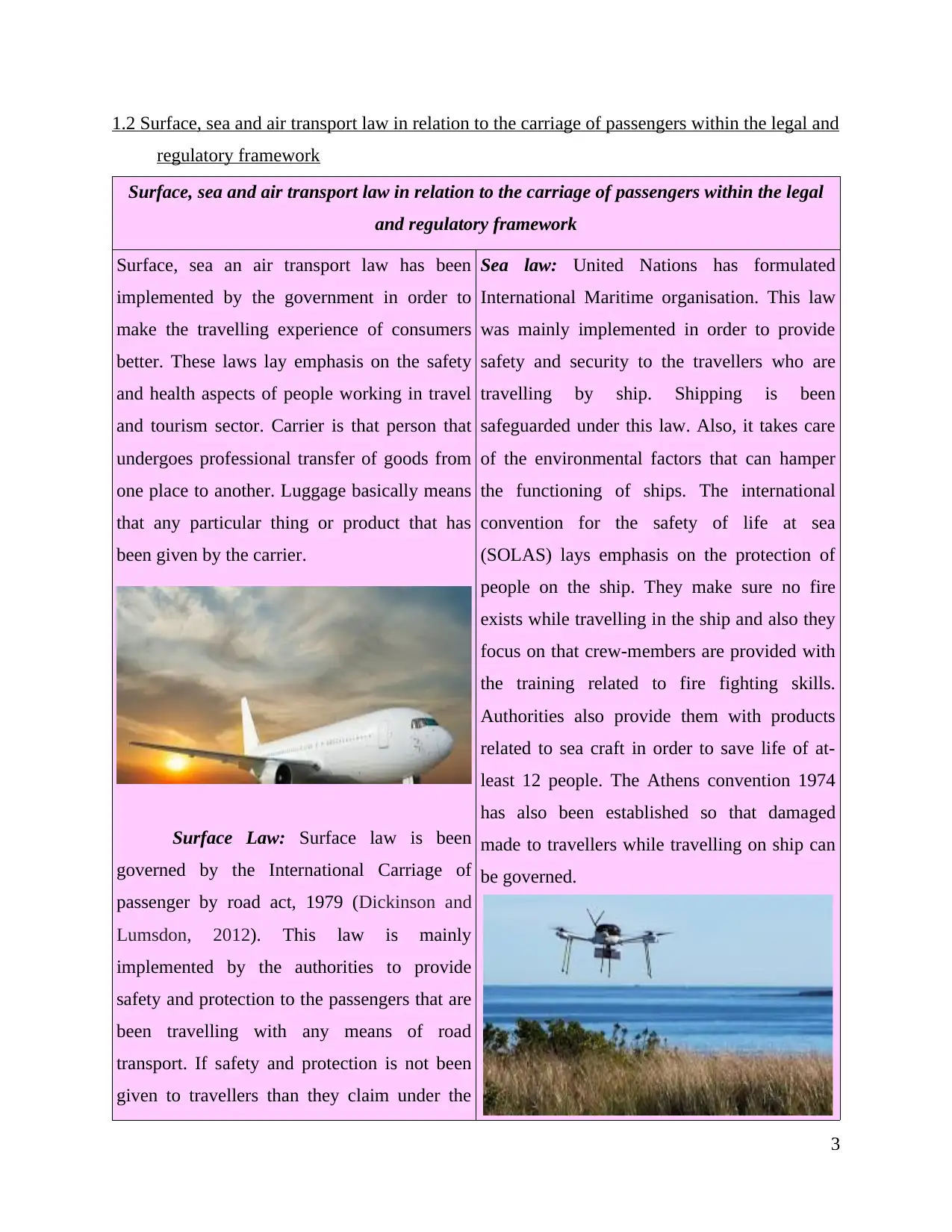
1.2 Surface, sea and air transport law in relation to the carriage of passengers within the legal and
regulatory framework
Surface, sea and air transport law in relation to the carriage of passengers within the legal
and regulatory framework
Surface, sea an air transport law has been
implemented by the government in order to
make the travelling experience of consumers
better. These laws lay emphasis on the safety
and health aspects of people working in travel
and tourism sector. Carrier is that person that
undergoes professional transfer of goods from
one place to another. Luggage basically means
that any particular thing or product that has
been given by the carrier.
Surface Law: Surface law is been
governed by the International Carriage of
passenger by road act, 1979 (Dickinson and
Lumsdon, 2012). This law is mainly
implemented by the authorities to provide
safety and protection to the passengers that are
been travelling with any means of road
transport. If safety and protection is not been
given to travellers than they claim under the
Sea law: United Nations has formulated
International Maritime organisation. This law
was mainly implemented in order to provide
safety and security to the travellers who are
travelling by ship. Shipping is been
safeguarded under this law. Also, it takes care
of the environmental factors that can hamper
the functioning of ships. The international
convention for the safety of life at sea
(SOLAS) lays emphasis on the protection of
people on the ship. They make sure no fire
exists while travelling in the ship and also they
focus on that crew-members are provided with
the training related to fire fighting skills.
Authorities also provide them with products
related to sea craft in order to save life of at-
least 12 people. The Athens convention 1974
has also been established so that damaged
made to travellers while travelling on ship can
be governed.
3
regulatory framework
Surface, sea and air transport law in relation to the carriage of passengers within the legal
and regulatory framework
Surface, sea an air transport law has been
implemented by the government in order to
make the travelling experience of consumers
better. These laws lay emphasis on the safety
and health aspects of people working in travel
and tourism sector. Carrier is that person that
undergoes professional transfer of goods from
one place to another. Luggage basically means
that any particular thing or product that has
been given by the carrier.
Surface Law: Surface law is been
governed by the International Carriage of
passenger by road act, 1979 (Dickinson and
Lumsdon, 2012). This law is mainly
implemented by the authorities to provide
safety and protection to the passengers that are
been travelling with any means of road
transport. If safety and protection is not been
given to travellers than they claim under the
Sea law: United Nations has formulated
International Maritime organisation. This law
was mainly implemented in order to provide
safety and security to the travellers who are
travelling by ship. Shipping is been
safeguarded under this law. Also, it takes care
of the environmental factors that can hamper
the functioning of ships. The international
convention for the safety of life at sea
(SOLAS) lays emphasis on the protection of
people on the ship. They make sure no fire
exists while travelling in the ship and also they
focus on that crew-members are provided with
the training related to fire fighting skills.
Authorities also provide them with products
related to sea craft in order to save life of at-
least 12 people. The Athens convention 1974
has also been established so that damaged
made to travellers while travelling on ship can
be governed.
3
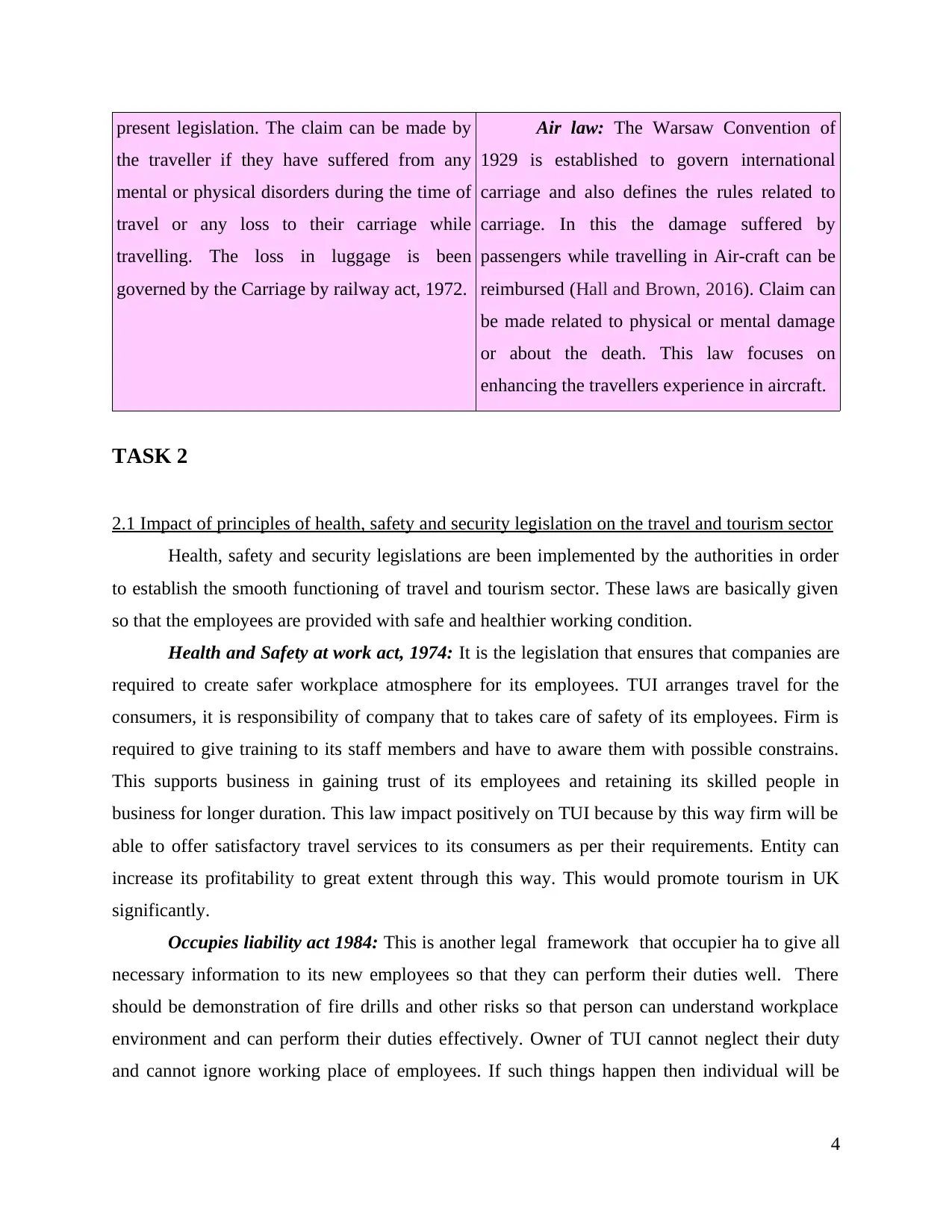
present legislation. The claim can be made by
the traveller if they have suffered from any
mental or physical disorders during the time of
travel or any loss to their carriage while
travelling. The loss in luggage is been
governed by the Carriage by railway act, 1972.
Air law: The Warsaw Convention of
1929 is established to govern international
carriage and also defines the rules related to
carriage. In this the damage suffered by
passengers while travelling in Air-craft can be
reimbursed (Hall and Brown, 2016). Claim can
be made related to physical or mental damage
or about the death. This law focuses on
enhancing the travellers experience in aircraft.
TASK 2
2.1 Impact of principles of health, safety and security legislation on the travel and tourism sector
Health, safety and security legislations are been implemented by the authorities in order
to establish the smooth functioning of travel and tourism sector. These laws are basically given
so that the employees are provided with safe and healthier working condition.
Health and Safety at work act, 1974: It is the legislation that ensures that companies are
required to create safer workplace atmosphere for its employees. TUI arranges travel for the
consumers, it is responsibility of company that to takes care of safety of its employees. Firm is
required to give training to its staff members and have to aware them with possible constrains.
This supports business in gaining trust of its employees and retaining its skilled people in
business for longer duration. This law impact positively on TUI because by this way firm will be
able to offer satisfactory travel services to its consumers as per their requirements. Entity can
increase its profitability to great extent through this way. This would promote tourism in UK
significantly.
Occupies liability act 1984: This is another legal framework that occupier ha to give all
necessary information to its new employees so that they can perform their duties well. There
should be demonstration of fire drills and other risks so that person can understand workplace
environment and can perform their duties effectively. Owner of TUI cannot neglect their duty
and cannot ignore working place of employees. If such things happen then individual will be
4
the traveller if they have suffered from any
mental or physical disorders during the time of
travel or any loss to their carriage while
travelling. The loss in luggage is been
governed by the Carriage by railway act, 1972.
Air law: The Warsaw Convention of
1929 is established to govern international
carriage and also defines the rules related to
carriage. In this the damage suffered by
passengers while travelling in Air-craft can be
reimbursed (Hall and Brown, 2016). Claim can
be made related to physical or mental damage
or about the death. This law focuses on
enhancing the travellers experience in aircraft.
TASK 2
2.1 Impact of principles of health, safety and security legislation on the travel and tourism sector
Health, safety and security legislations are been implemented by the authorities in order
to establish the smooth functioning of travel and tourism sector. These laws are basically given
so that the employees are provided with safe and healthier working condition.
Health and Safety at work act, 1974: It is the legislation that ensures that companies are
required to create safer workplace atmosphere for its employees. TUI arranges travel for the
consumers, it is responsibility of company that to takes care of safety of its employees. Firm is
required to give training to its staff members and have to aware them with possible constrains.
This supports business in gaining trust of its employees and retaining its skilled people in
business for longer duration. This law impact positively on TUI because by this way firm will be
able to offer satisfactory travel services to its consumers as per their requirements. Entity can
increase its profitability to great extent through this way. This would promote tourism in UK
significantly.
Occupies liability act 1984: This is another legal framework that occupier ha to give all
necessary information to its new employees so that they can perform their duties well. There
should be demonstration of fire drills and other risks so that person can understand workplace
environment and can perform their duties effectively. Owner of TUI cannot neglect their duty
and cannot ignore working place of employees. If such things happen then individual will be
4
⊘ This is a preview!⊘
Do you want full access?
Subscribe today to unlock all pages.

Trusted by 1+ million students worldwide
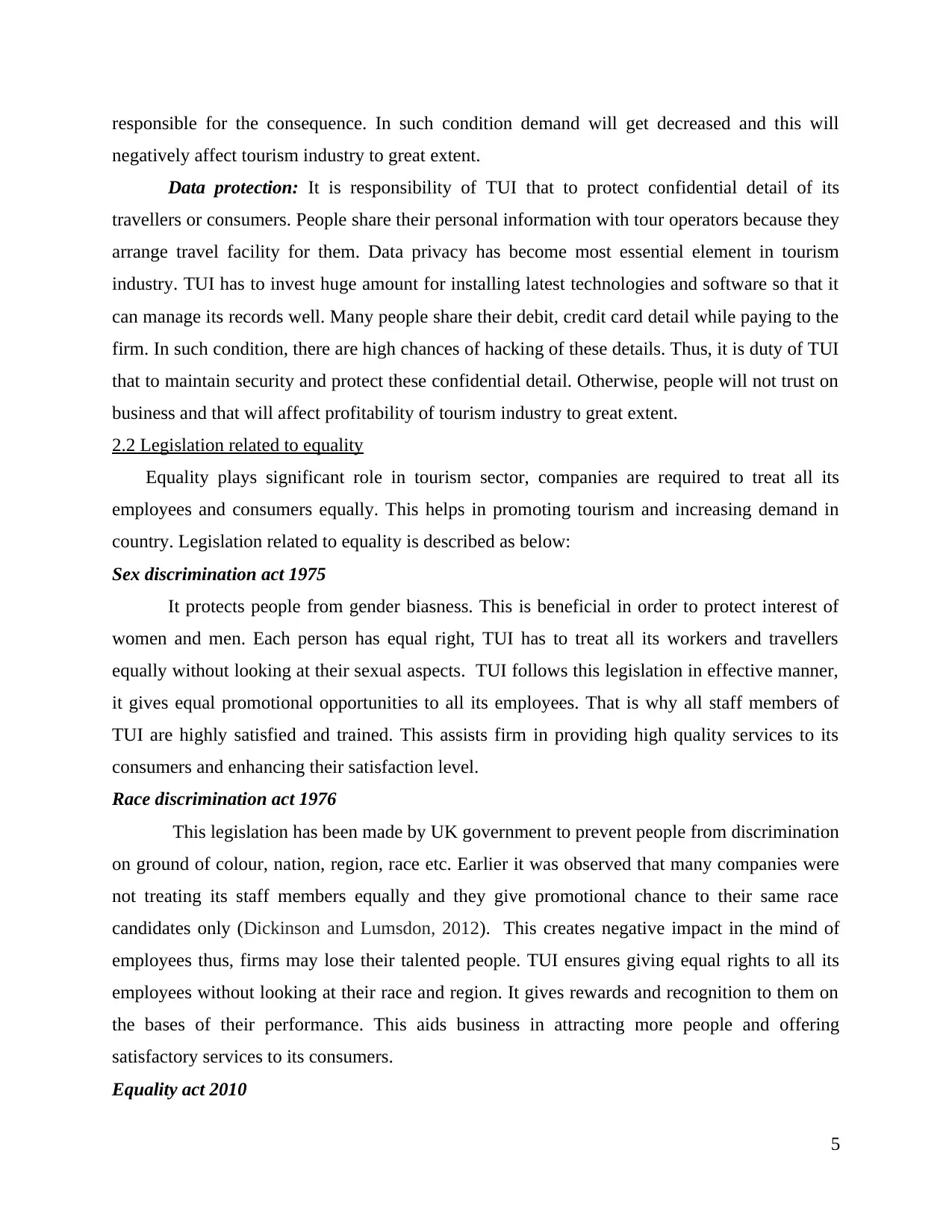
responsible for the consequence. In such condition demand will get decreased and this will
negatively affect tourism industry to great extent.
Data protection: It is responsibility of TUI that to protect confidential detail of its
travellers or consumers. People share their personal information with tour operators because they
arrange travel facility for them. Data privacy has become most essential element in tourism
industry. TUI has to invest huge amount for installing latest technologies and software so that it
can manage its records well. Many people share their debit, credit card detail while paying to the
firm. In such condition, there are high chances of hacking of these details. Thus, it is duty of TUI
that to maintain security and protect these confidential detail. Otherwise, people will not trust on
business and that will affect profitability of tourism industry to great extent.
2.2 Legislation related to equality
Equality plays significant role in tourism sector, companies are required to treat all its
employees and consumers equally. This helps in promoting tourism and increasing demand in
country. Legislation related to equality is described as below:
Sex discrimination act 1975
It protects people from gender biasness. This is beneficial in order to protect interest of
women and men. Each person has equal right, TUI has to treat all its workers and travellers
equally without looking at their sexual aspects. TUI follows this legislation in effective manner,
it gives equal promotional opportunities to all its employees. That is why all staff members of
TUI are highly satisfied and trained. This assists firm in providing high quality services to its
consumers and enhancing their satisfaction level.
Race discrimination act 1976
This legislation has been made by UK government to prevent people from discrimination
on ground of colour, nation, region, race etc. Earlier it was observed that many companies were
not treating its staff members equally and they give promotional chance to their same race
candidates only (Dickinson and Lumsdon, 2012). This creates negative impact in the mind of
employees thus, firms may lose their talented people. TUI ensures giving equal rights to all its
employees without looking at their race and region. It gives rewards and recognition to them on
the bases of their performance. This aids business in attracting more people and offering
satisfactory services to its consumers.
Equality act 2010
5
negatively affect tourism industry to great extent.
Data protection: It is responsibility of TUI that to protect confidential detail of its
travellers or consumers. People share their personal information with tour operators because they
arrange travel facility for them. Data privacy has become most essential element in tourism
industry. TUI has to invest huge amount for installing latest technologies and software so that it
can manage its records well. Many people share their debit, credit card detail while paying to the
firm. In such condition, there are high chances of hacking of these details. Thus, it is duty of TUI
that to maintain security and protect these confidential detail. Otherwise, people will not trust on
business and that will affect profitability of tourism industry to great extent.
2.2 Legislation related to equality
Equality plays significant role in tourism sector, companies are required to treat all its
employees and consumers equally. This helps in promoting tourism and increasing demand in
country. Legislation related to equality is described as below:
Sex discrimination act 1975
It protects people from gender biasness. This is beneficial in order to protect interest of
women and men. Each person has equal right, TUI has to treat all its workers and travellers
equally without looking at their sexual aspects. TUI follows this legislation in effective manner,
it gives equal promotional opportunities to all its employees. That is why all staff members of
TUI are highly satisfied and trained. This assists firm in providing high quality services to its
consumers and enhancing their satisfaction level.
Race discrimination act 1976
This legislation has been made by UK government to prevent people from discrimination
on ground of colour, nation, region, race etc. Earlier it was observed that many companies were
not treating its staff members equally and they give promotional chance to their same race
candidates only (Dickinson and Lumsdon, 2012). This creates negative impact in the mind of
employees thus, firms may lose their talented people. TUI ensures giving equal rights to all its
employees without looking at their race and region. It gives rewards and recognition to them on
the bases of their performance. This aids business in attracting more people and offering
satisfactory services to its consumers.
Equality act 2010
5
Paraphrase This Document
Need a fresh take? Get an instant paraphrase of this document with our AI Paraphraser
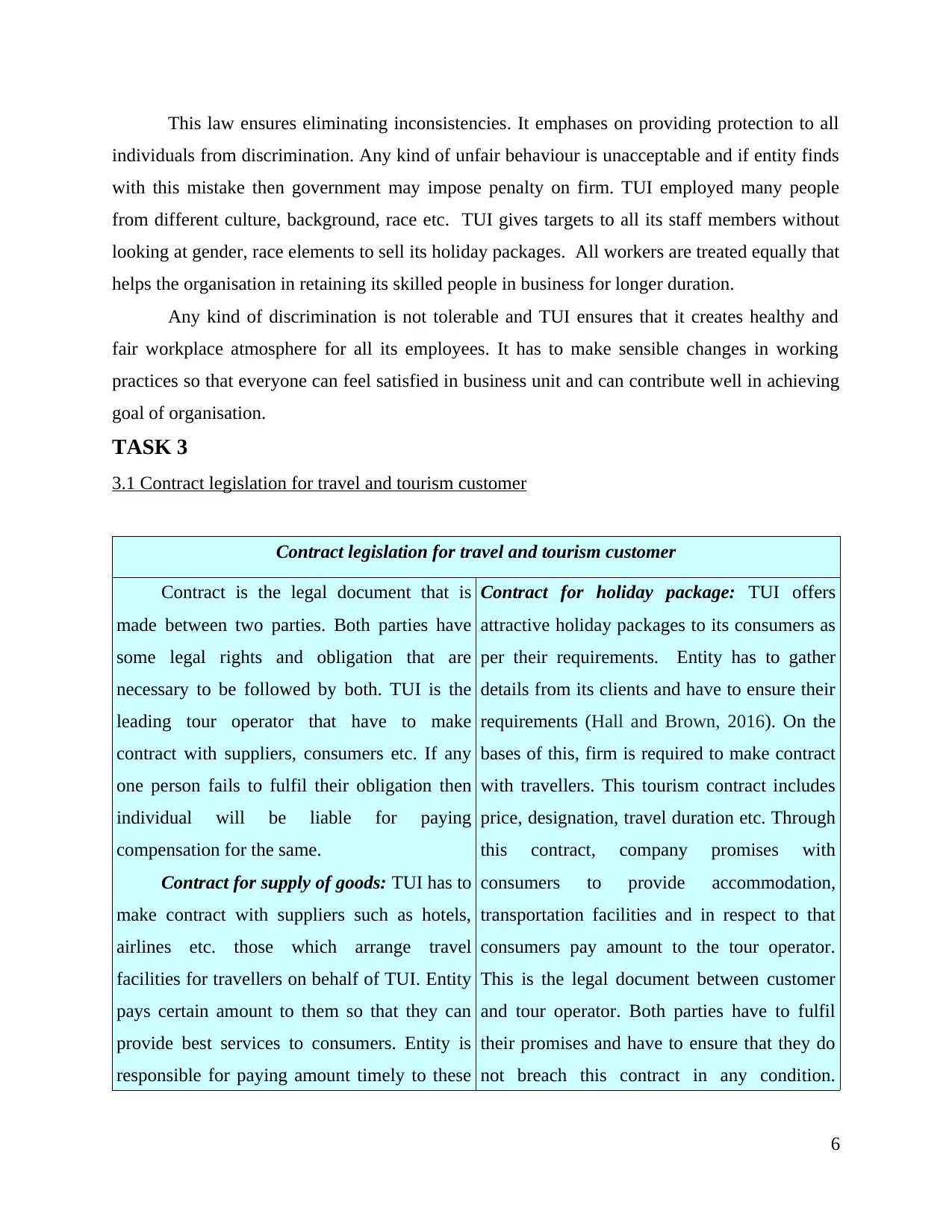
This law ensures eliminating inconsistencies. It emphases on providing protection to all
individuals from discrimination. Any kind of unfair behaviour is unacceptable and if entity finds
with this mistake then government may impose penalty on firm. TUI employed many people
from different culture, background, race etc. TUI gives targets to all its staff members without
looking at gender, race elements to sell its holiday packages. All workers are treated equally that
helps the organisation in retaining its skilled people in business for longer duration.
Any kind of discrimination is not tolerable and TUI ensures that it creates healthy and
fair workplace atmosphere for all its employees. It has to make sensible changes in working
practices so that everyone can feel satisfied in business unit and can contribute well in achieving
goal of organisation.
TASK 3
3.1 Contract legislation for travel and tourism customer
Contract legislation for travel and tourism customer
Contract is the legal document that is
made between two parties. Both parties have
some legal rights and obligation that are
necessary to be followed by both. TUI is the
leading tour operator that have to make
contract with suppliers, consumers etc. If any
one person fails to fulfil their obligation then
individual will be liable for paying
compensation for the same.
Contract for supply of goods: TUI has to
make contract with suppliers such as hotels,
airlines etc. those which arrange travel
facilities for travellers on behalf of TUI. Entity
pays certain amount to them so that they can
provide best services to consumers. Entity is
responsible for paying amount timely to these
Contract for holiday package: TUI offers
attractive holiday packages to its consumers as
per their requirements. Entity has to gather
details from its clients and have to ensure their
requirements (Hall and Brown, 2016). On the
bases of this, firm is required to make contract
with travellers. This tourism contract includes
price, designation, travel duration etc. Through
this contract, company promises with
consumers to provide accommodation,
transportation facilities and in respect to that
consumers pay amount to the tour operator.
This is the legal document between customer
and tour operator. Both parties have to fulfil
their promises and have to ensure that they do
not breach this contract in any condition.
6
individuals from discrimination. Any kind of unfair behaviour is unacceptable and if entity finds
with this mistake then government may impose penalty on firm. TUI employed many people
from different culture, background, race etc. TUI gives targets to all its staff members without
looking at gender, race elements to sell its holiday packages. All workers are treated equally that
helps the organisation in retaining its skilled people in business for longer duration.
Any kind of discrimination is not tolerable and TUI ensures that it creates healthy and
fair workplace atmosphere for all its employees. It has to make sensible changes in working
practices so that everyone can feel satisfied in business unit and can contribute well in achieving
goal of organisation.
TASK 3
3.1 Contract legislation for travel and tourism customer
Contract legislation for travel and tourism customer
Contract is the legal document that is
made between two parties. Both parties have
some legal rights and obligation that are
necessary to be followed by both. TUI is the
leading tour operator that have to make
contract with suppliers, consumers etc. If any
one person fails to fulfil their obligation then
individual will be liable for paying
compensation for the same.
Contract for supply of goods: TUI has to
make contract with suppliers such as hotels,
airlines etc. those which arrange travel
facilities for travellers on behalf of TUI. Entity
pays certain amount to them so that they can
provide best services to consumers. Entity is
responsible for paying amount timely to these
Contract for holiday package: TUI offers
attractive holiday packages to its consumers as
per their requirements. Entity has to gather
details from its clients and have to ensure their
requirements (Hall and Brown, 2016). On the
bases of this, firm is required to make contract
with travellers. This tourism contract includes
price, designation, travel duration etc. Through
this contract, company promises with
consumers to provide accommodation,
transportation facilities and in respect to that
consumers pay amount to the tour operator.
This is the legal document between customer
and tour operator. Both parties have to fulfil
their promises and have to ensure that they do
not breach this contract in any condition.
6
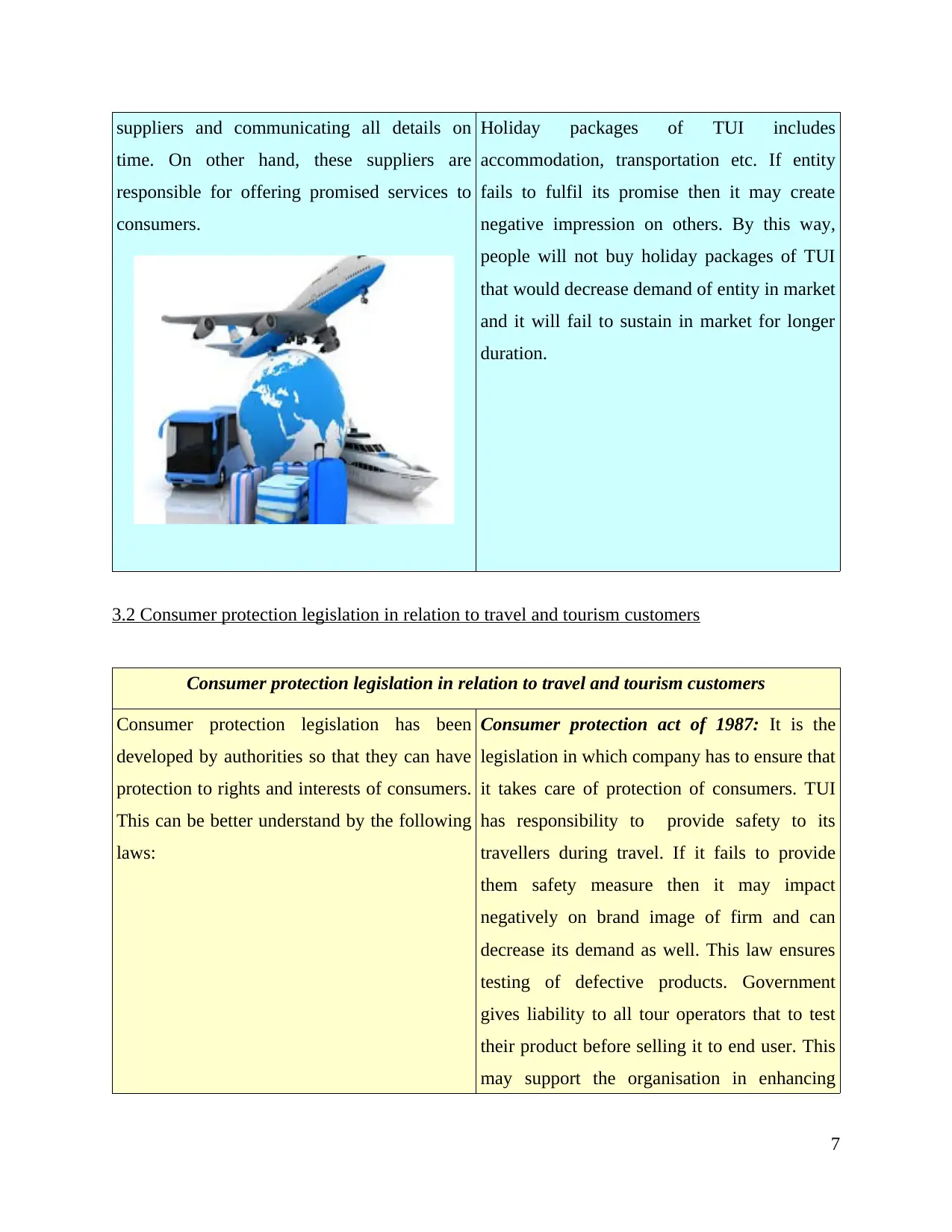
suppliers and communicating all details on
time. On other hand, these suppliers are
responsible for offering promised services to
consumers.
Holiday packages of TUI includes
accommodation, transportation etc. If entity
fails to fulfil its promise then it may create
negative impression on others. By this way,
people will not buy holiday packages of TUI
that would decrease demand of entity in market
and it will fail to sustain in market for longer
duration.
3.2 Consumer protection legislation in relation to travel and tourism customers
Consumer protection legislation in relation to travel and tourism customers
Consumer protection legislation has been
developed by authorities so that they can have
protection to rights and interests of consumers.
This can be better understand by the following
laws:
Consumer protection act of 1987: It is the
legislation in which company has to ensure that
it takes care of protection of consumers. TUI
has responsibility to provide safety to its
travellers during travel. If it fails to provide
them safety measure then it may impact
negatively on brand image of firm and can
decrease its demand as well. This law ensures
testing of defective products. Government
gives liability to all tour operators that to test
their product before selling it to end user. This
may support the organisation in enhancing
7
time. On other hand, these suppliers are
responsible for offering promised services to
consumers.
Holiday packages of TUI includes
accommodation, transportation etc. If entity
fails to fulfil its promise then it may create
negative impression on others. By this way,
people will not buy holiday packages of TUI
that would decrease demand of entity in market
and it will fail to sustain in market for longer
duration.
3.2 Consumer protection legislation in relation to travel and tourism customers
Consumer protection legislation in relation to travel and tourism customers
Consumer protection legislation has been
developed by authorities so that they can have
protection to rights and interests of consumers.
This can be better understand by the following
laws:
Consumer protection act of 1987: It is the
legislation in which company has to ensure that
it takes care of protection of consumers. TUI
has responsibility to provide safety to its
travellers during travel. If it fails to provide
them safety measure then it may impact
negatively on brand image of firm and can
decrease its demand as well. This law ensures
testing of defective products. Government
gives liability to all tour operators that to test
their product before selling it to end user. This
may support the organisation in enhancing
7
⊘ This is a preview!⊘
Do you want full access?
Subscribe today to unlock all pages.

Trusted by 1+ million students worldwide
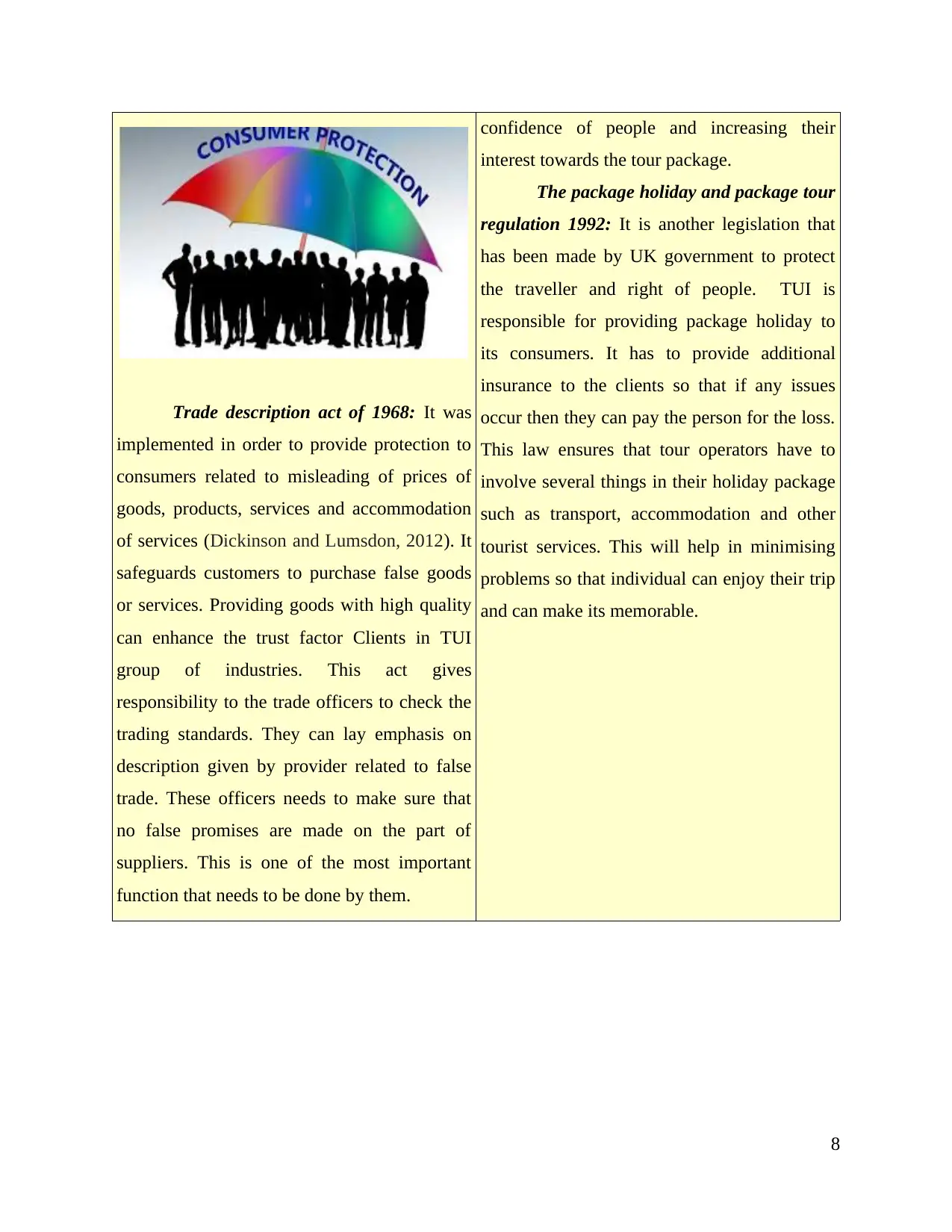
Trade description act of 1968: It was
implemented in order to provide protection to
consumers related to misleading of prices of
goods, products, services and accommodation
of services (Dickinson and Lumsdon, 2012). It
safeguards customers to purchase false goods
or services. Providing goods with high quality
can enhance the trust factor Clients in TUI
group of industries. This act gives
responsibility to the trade officers to check the
trading standards. They can lay emphasis on
description given by provider related to false
trade. These officers needs to make sure that
no false promises are made on the part of
suppliers. This is one of the most important
function that needs to be done by them.
confidence of people and increasing their
interest towards the tour package.
The package holiday and package tour
regulation 1992: It is another legislation that
has been made by UK government to protect
the traveller and right of people. TUI is
responsible for providing package holiday to
its consumers. It has to provide additional
insurance to the clients so that if any issues
occur then they can pay the person for the loss.
This law ensures that tour operators have to
involve several things in their holiday package
such as transport, accommodation and other
tourist services. This will help in minimising
problems so that individual can enjoy their trip
and can make its memorable.
8
implemented in order to provide protection to
consumers related to misleading of prices of
goods, products, services and accommodation
of services (Dickinson and Lumsdon, 2012). It
safeguards customers to purchase false goods
or services. Providing goods with high quality
can enhance the trust factor Clients in TUI
group of industries. This act gives
responsibility to the trade officers to check the
trading standards. They can lay emphasis on
description given by provider related to false
trade. These officers needs to make sure that
no false promises are made on the part of
suppliers. This is one of the most important
function that needs to be done by them.
confidence of people and increasing their
interest towards the tour package.
The package holiday and package tour
regulation 1992: It is another legislation that
has been made by UK government to protect
the traveller and right of people. TUI is
responsible for providing package holiday to
its consumers. It has to provide additional
insurance to the clients so that if any issues
occur then they can pay the person for the loss.
This law ensures that tour operators have to
involve several things in their holiday package
such as transport, accommodation and other
tourist services. This will help in minimising
problems so that individual can enjoy their trip
and can make its memorable.
8
Paraphrase This Document
Need a fresh take? Get an instant paraphrase of this document with our AI Paraphraser
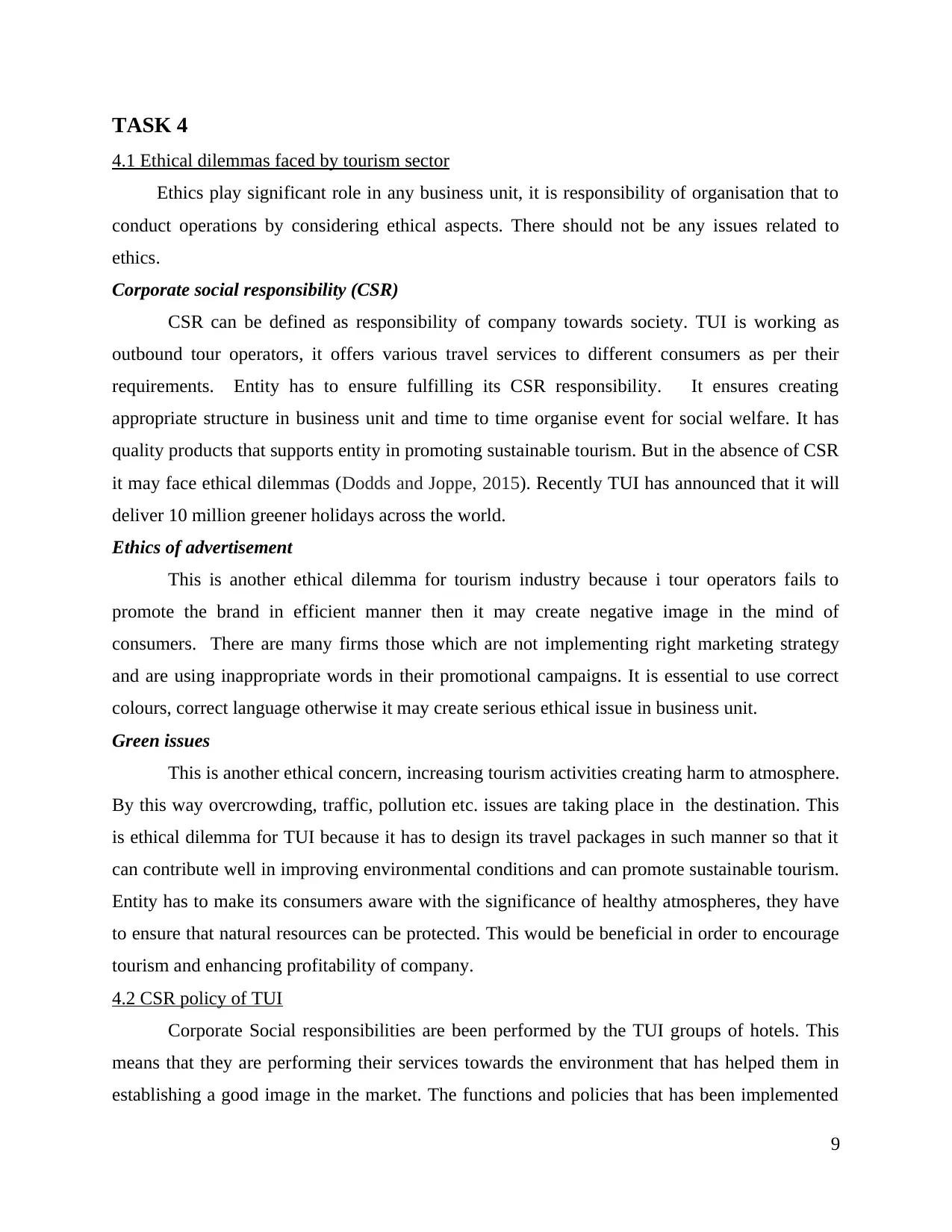
TASK 4
4.1 Ethical dilemmas faced by tourism sector
Ethics play significant role in any business unit, it is responsibility of organisation that to
conduct operations by considering ethical aspects. There should not be any issues related to
ethics.
Corporate social responsibility (CSR)
CSR can be defined as responsibility of company towards society. TUI is working as
outbound tour operators, it offers various travel services to different consumers as per their
requirements. Entity has to ensure fulfilling its CSR responsibility. It ensures creating
appropriate structure in business unit and time to time organise event for social welfare. It has
quality products that supports entity in promoting sustainable tourism. But in the absence of CSR
it may face ethical dilemmas (Dodds and Joppe, 2015). Recently TUI has announced that it will
deliver 10 million greener holidays across the world.
Ethics of advertisement
This is another ethical dilemma for tourism industry because i tour operators fails to
promote the brand in efficient manner then it may create negative image in the mind of
consumers. There are many firms those which are not implementing right marketing strategy
and are using inappropriate words in their promotional campaigns. It is essential to use correct
colours, correct language otherwise it may create serious ethical issue in business unit.
Green issues
This is another ethical concern, increasing tourism activities creating harm to atmosphere.
By this way overcrowding, traffic, pollution etc. issues are taking place in the destination. This
is ethical dilemma for TUI because it has to design its travel packages in such manner so that it
can contribute well in improving environmental conditions and can promote sustainable tourism.
Entity has to make its consumers aware with the significance of healthy atmospheres, they have
to ensure that natural resources can be protected. This would be beneficial in order to encourage
tourism and enhancing profitability of company.
4.2 CSR policy of TUI
Corporate Social responsibilities are been performed by the TUI groups of hotels. This
means that they are performing their services towards the environment that has helped them in
establishing a good image in the market. The functions and policies that has been implemented
9
4.1 Ethical dilemmas faced by tourism sector
Ethics play significant role in any business unit, it is responsibility of organisation that to
conduct operations by considering ethical aspects. There should not be any issues related to
ethics.
Corporate social responsibility (CSR)
CSR can be defined as responsibility of company towards society. TUI is working as
outbound tour operators, it offers various travel services to different consumers as per their
requirements. Entity has to ensure fulfilling its CSR responsibility. It ensures creating
appropriate structure in business unit and time to time organise event for social welfare. It has
quality products that supports entity in promoting sustainable tourism. But in the absence of CSR
it may face ethical dilemmas (Dodds and Joppe, 2015). Recently TUI has announced that it will
deliver 10 million greener holidays across the world.
Ethics of advertisement
This is another ethical dilemma for tourism industry because i tour operators fails to
promote the brand in efficient manner then it may create negative image in the mind of
consumers. There are many firms those which are not implementing right marketing strategy
and are using inappropriate words in their promotional campaigns. It is essential to use correct
colours, correct language otherwise it may create serious ethical issue in business unit.
Green issues
This is another ethical concern, increasing tourism activities creating harm to atmosphere.
By this way overcrowding, traffic, pollution etc. issues are taking place in the destination. This
is ethical dilemma for TUI because it has to design its travel packages in such manner so that it
can contribute well in improving environmental conditions and can promote sustainable tourism.
Entity has to make its consumers aware with the significance of healthy atmospheres, they have
to ensure that natural resources can be protected. This would be beneficial in order to encourage
tourism and enhancing profitability of company.
4.2 CSR policy of TUI
Corporate Social responsibilities are been performed by the TUI groups of hotels. This
means that they are performing their services towards the environment that has helped them in
establishing a good image in the market. The functions and policies that has been implemented
9
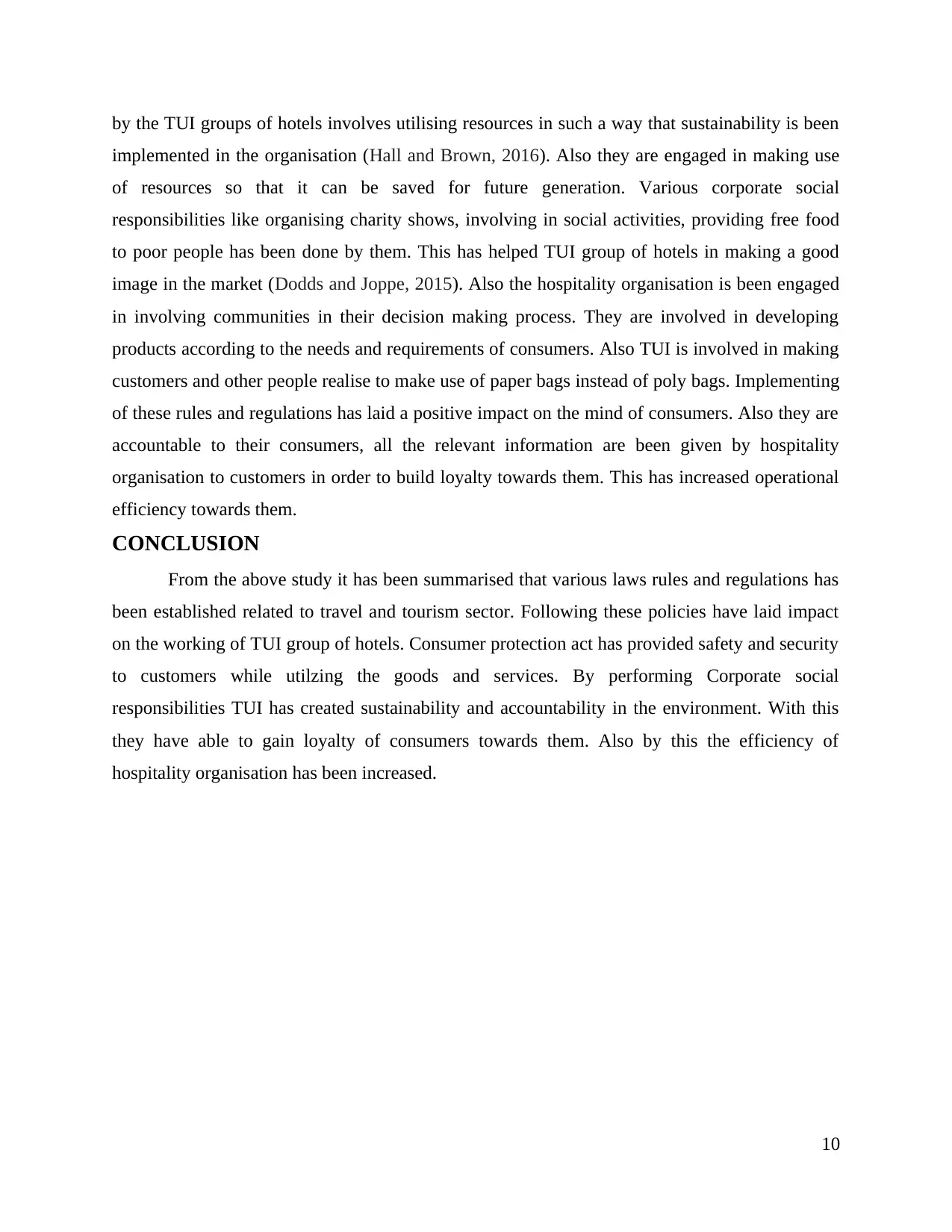
by the TUI groups of hotels involves utilising resources in such a way that sustainability is been
implemented in the organisation (Hall and Brown, 2016). Also they are engaged in making use
of resources so that it can be saved for future generation. Various corporate social
responsibilities like organising charity shows, involving in social activities, providing free food
to poor people has been done by them. This has helped TUI group of hotels in making a good
image in the market (Dodds and Joppe, 2015). Also the hospitality organisation is been engaged
in involving communities in their decision making process. They are involved in developing
products according to the needs and requirements of consumers. Also TUI is involved in making
customers and other people realise to make use of paper bags instead of poly bags. Implementing
of these rules and regulations has laid a positive impact on the mind of consumers. Also they are
accountable to their consumers, all the relevant information are been given by hospitality
organisation to customers in order to build loyalty towards them. This has increased operational
efficiency towards them.
CONCLUSION
From the above study it has been summarised that various laws rules and regulations has
been established related to travel and tourism sector. Following these policies have laid impact
on the working of TUI group of hotels. Consumer protection act has provided safety and security
to customers while utilzing the goods and services. By performing Corporate social
responsibilities TUI has created sustainability and accountability in the environment. With this
they have able to gain loyalty of consumers towards them. Also by this the efficiency of
hospitality organisation has been increased.
10
implemented in the organisation (Hall and Brown, 2016). Also they are engaged in making use
of resources so that it can be saved for future generation. Various corporate social
responsibilities like organising charity shows, involving in social activities, providing free food
to poor people has been done by them. This has helped TUI group of hotels in making a good
image in the market (Dodds and Joppe, 2015). Also the hospitality organisation is been engaged
in involving communities in their decision making process. They are involved in developing
products according to the needs and requirements of consumers. Also TUI is involved in making
customers and other people realise to make use of paper bags instead of poly bags. Implementing
of these rules and regulations has laid a positive impact on the mind of consumers. Also they are
accountable to their consumers, all the relevant information are been given by hospitality
organisation to customers in order to build loyalty towards them. This has increased operational
efficiency towards them.
CONCLUSION
From the above study it has been summarised that various laws rules and regulations has
been established related to travel and tourism sector. Following these policies have laid impact
on the working of TUI group of hotels. Consumer protection act has provided safety and security
to customers while utilzing the goods and services. By performing Corporate social
responsibilities TUI has created sustainability and accountability in the environment. With this
they have able to gain loyalty of consumers towards them. Also by this the efficiency of
hospitality organisation has been increased.
10
⊘ This is a preview!⊘
Do you want full access?
Subscribe today to unlock all pages.

Trusted by 1+ million students worldwide
1 out of 13
Related Documents
Your All-in-One AI-Powered Toolkit for Academic Success.
+13062052269
info@desklib.com
Available 24*7 on WhatsApp / Email
![[object Object]](/_next/static/media/star-bottom.7253800d.svg)
Unlock your academic potential
Copyright © 2020–2026 A2Z Services. All Rights Reserved. Developed and managed by ZUCOL.




